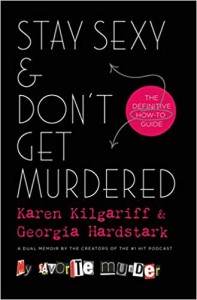
by Chanel Dubofsky
“My Favorite Murder” Podcast Hosts Take on Trauma and Hope in New Book
I’m not sure when, in the course of my entirely unsupervised reading and television watching as a child and adolescent, I became obsessed with murder. Nor do I remember exactly when I realized many people thought it was weird to be obsessed with murder, but I assume it resulted in an awkward social situation that I’ve since blocked out. It didn’t stop me, of course — that’s what obsession is —and as it turns out, I am far from the only person who continually consumes true crime: tv shows, documentaries and podcasts.
 Which brings me to a new book that will be sure to satisfy my fellow obsessives — Stay Sexy and Don’t Get Murdered: The Definitive How To Guide, by Karen Kilgariff and Georgia Hardstark, hosts of the true crime comedy podcast “My Favorite Murder.”
Which brings me to a new book that will be sure to satisfy my fellow obsessives — Stay Sexy and Don’t Get Murdered: The Definitive How To Guide, by Karen Kilgariff and Georgia Hardstark, hosts of the true crime comedy podcast “My Favorite Murder.”
Karen and Georgia met at a party, after Karen’s story about witnessing a terrible car accident drove the group of people she was talking to away, and Georgia, who had been listening, approached Karen and said, “Tell me everything.” Their mutual obsession with murder, serial killers, cold cases, survivor stories, kidnappings, and all other things that fall under the category of “inappropriate for cocktail party chat,” led to the creation of a podcast, and it could be argued successfully, a small empire.
Before you decide that you’re not interested in reading a book about murder, let me be clear: this is not a book about murder. It’s also not a book about anxiety, in spite of the fact that if you search the self-help section on Amazon, that’s where it will appear. Karen and Georgia talk about their past and present with therapy, SSRIs, and addiction in the book and on their podcast.
In this book, they get real about their own lives: the dangerous (Georgia going out to the desert with a man who wanted to take her picture), the sad (Karen’s mother’s death), and the embarrassing (middle school), and you’ll likely find yourself relating and probably wishing they wouldn’t be so hard on themselves. But this is a self-help book, after all, and so there is advice, from how to feed yourself as a latch-key kid to how not act like a loon when you’re drunk to who not to listen to for career advice. Perhaps most relevant to our daily lives: how to talk yourself back from your meanest, darkest thought. Their advice? Think about what you would say to your tiny, vulnerable, younger self. You’d be kind to her, right? You would want others to be. So be kind to her now.
I came across a meme on Instagram recently which said that people who have experienced trauma might have a higher threshold for emotional pain. Anxiety and grief and fear create layers, they can swaddle us from a world where trauma and danger replay themselves over and over, and so, we absorb. We might even seek out the violent and the dark to soothe our anxiety. Maybe that explains the true crime phenomenon.
It’s hard to explain to those who don’t consume podcasts and documentaries and audiobooks about murderers like they’re cookies (although snacking is a big part of my true crime habit), and so it’s vital that we find our people, regardless of why we’re fascinated by these things. The good news is that they’re here in this book. I said this wasn’t a book about murder, and I meant it: it’s a book about hope, about how to avoid surrendering to yourself in your worst moments, and at the same time, knowing that if you do, it’s okay, that doesn’t mean you have to stay in the darkness forever.